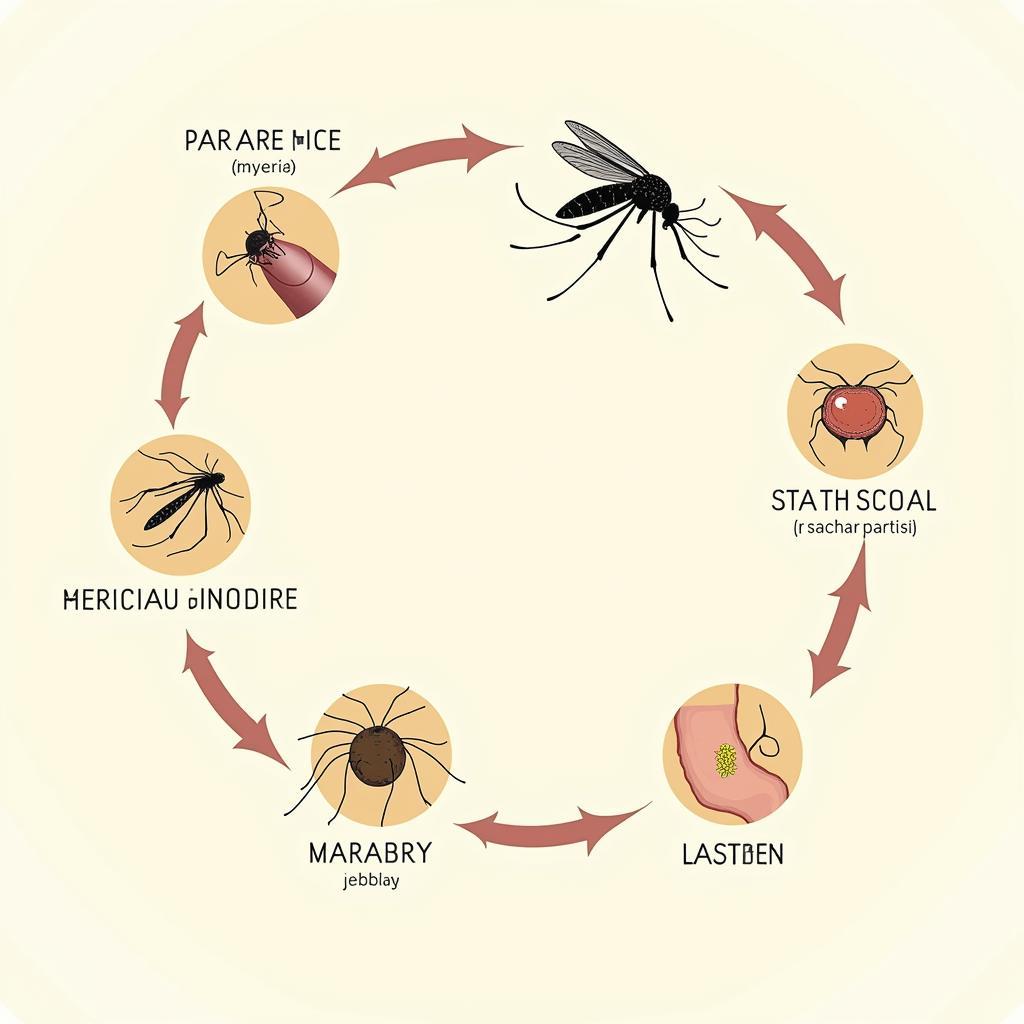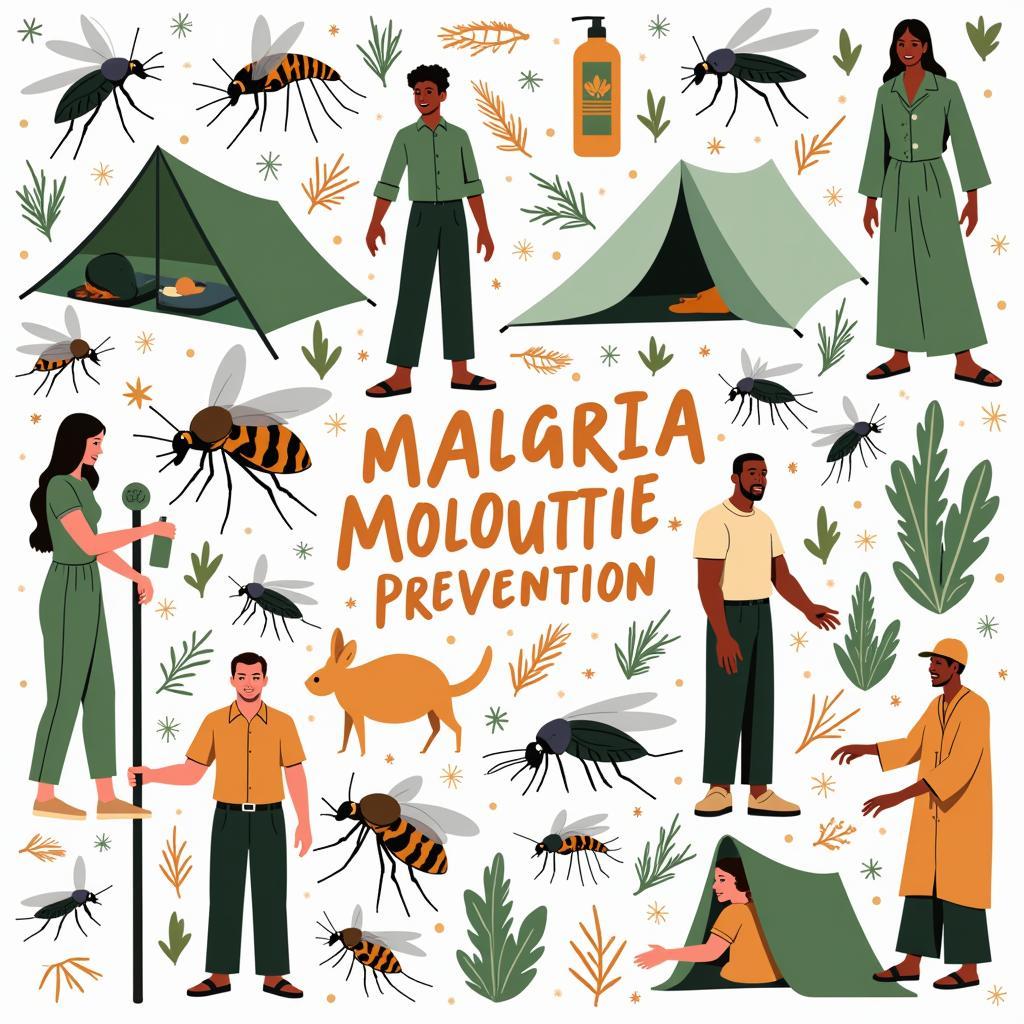Malaria remains a significant health concern in Pakistan, particularly during and after the monsoon season. Understanding the disease, available Malaria Medicine In Pakistan, and prevention methods is crucial for staying safe and healthy. This comprehensive guide will equip you with the knowledge to protect yourself and your loved ones from this debilitating illness.
Understanding Malaria: Causes, Symptoms, and Risks
Malaria is a life-threatening disease caused by parasites transmitted through the bite of infected female Anopheles mosquitoes. These mosquitoes typically breed in stagnant water, making areas with poor sanitation and drainage particularly vulnerable.
The most common symptoms of malaria include:
- High fever
- Chills
- Sweating
- Headache
- Muscle pain
- Fatigue
- Nausea and vomiting
If you experience any of these symptoms, especially after visiting a malaria-prone area or during the monsoon season, it’s crucial to seek medical attention immediately.
 Malaria Transmission Cycle
Malaria Transmission Cycle
Types of Malaria Medicine in Pakistan
Several effective antimalarial medications are available in Pakistan, categorized into different classes based on their mechanism of action. These include:
- Artemisinin-based Combination Therapies (ACTs): ACTs are the most effective treatment for uncomplicated malaria caused by all parasite species. They combine an artemisinin derivative with a longer-acting antimalarial drug.
- Chloroquine: While once widely used, chloroquine resistance is now widespread. However, it may still be effective in certain areas and for specific types of malaria.
- Quinine: This medication is typically reserved for severe or complicated malaria cases, often administered intravenously in a hospital setting.
- Mefloquine: This medication is effective in preventing and treating malaria but may cause side effects like vivid dreams and dizziness.
It’s crucial to consult a healthcare professional for diagnosis and appropriate treatment. Self-medicating can be dangerous and lead to drug resistance, making malaria more difficult to treat in the future.
Preventing Malaria: Taking Proactive Steps
Prevention is always better than cure, especially with potentially life-threatening diseases like malaria. Here are some essential preventive measures to adopt:
- Mosquito Nets: Sleep under insecticide-treated mosquito nets every night, even if you’re only visiting a malaria-prone area for a short time.
- Repellents: Use mosquito repellents containing DEET, picaridin, or IR3535 on exposed skin to deter mosquito bites.
- Protective Clothing: Wear long-sleeved shirts, long pants, and socks, especially during dawn and dusk when mosquitoes are most active.
- Indoor Spraying: Spray your house with insecticide regularly, focusing on dark corners and areas where mosquitoes might rest.
- Eliminate Breeding Grounds: Prevent stagnant water from accumulating in your surroundings by regularly cleaning gutters, emptying containers, and covering water storage tanks.
 Effective Malaria Prevention Strategies
Effective Malaria Prevention Strategies
Choosing the Right Malaria Medicine: Factors to Consider
Selecting the appropriate malaria medication depends on various factors, including:
- Travel Destination: The type of malaria parasite and drug resistance patterns vary significantly across regions.
- Medical History: Certain medications may not be suitable for individuals with specific health conditions, allergies, or taking other medications.
- Age and Pregnancy: Pregnant women and young children may require different medications or dosages.
- Trip Duration: The duration of your trip influences the type and length of malaria prophylaxis needed.
Consulting a travel medicine specialist or your healthcare provider well in advance of your trip is crucial. They can assess your individual risk factors and recommend the most effective and safe malaria prevention and treatment options.
Frequently Asked Questions about Malaria Medicine in Pakistan
1. Can I buy malaria medicine over the counter in Pakistan?
While some antimalarial medications might be available without a prescription, it’s strongly recommended to consult a doctor for proper diagnosis and treatment.
2. Are there any side effects associated with malaria medicine?
Like all medications, antimalarials can cause side effects. However, these vary depending on the specific drug and individual tolerance.
3. How long do I need to take malaria medicine?
The duration of antimalarial medication depends on the type of drug and travel itinerary. It typically involves starting the medication before travel, continuing during the trip, and for a specific period after returning.
4. What should I do if I experience malaria symptoms despite taking medication?
Seek immediate medical attention, even if you’ve taken preventive medication. It’s crucial to rule out malaria or receive timely treatment if infected.
5. Where can I get more information about malaria in Pakistan?
Reliable information on malaria prevention and treatment is available from the World Health Organization (WHO), the Centers for Disease Control and Prevention (CDC), and the Ministry of National Health Services, Regulation and Coordination, Pakistan.
Conclusion: Staying Ahead of Malaria in Pakistan
While malaria remains a concern in Pakistan, understanding the disease, available medications, and preventive measures empowers you to minimize risks. By following expert recommendations, you can protect yourself and your loved ones from this preventable illness.
Remember, seeking timely medical advice and staying informed are crucial steps in staying healthy and enjoying your travels in Pakistan.
Need Assistance? Contact Us!
For any queries or support regarding health concerns in Pakistan, feel free to reach out to us:
Phone: +923337849799
Email: news.pakit@gmail.com
Address: Dera Ghazi Khan Rd, Rakhni, Barkhan, Balochistan, Pakistan.
Our dedicated customer support team is available 24/7 to assist you.